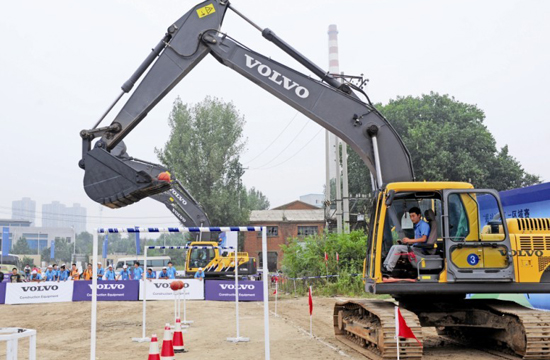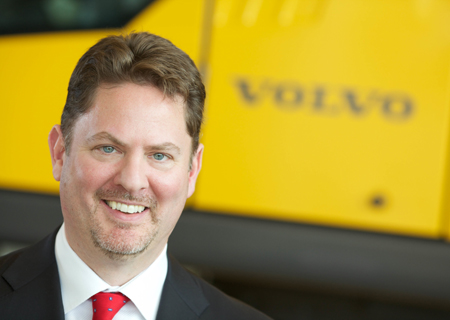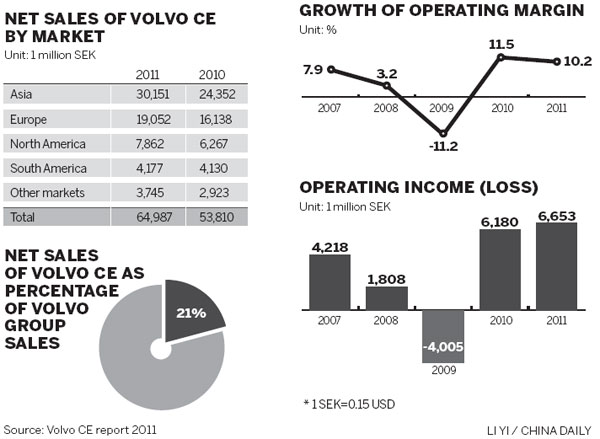|
 |
|
A contestant operates Volvo excavator to build blocks at the first excavator contest in Jinan, Shandong province, on Aug 9, 2011. [Photo/China Daily] |
Heavy equipment arm of Swedish giant grows Chinese market share as nation becomes part of company's DNA
Born to a blue-collar family, Patrick Olney, president and chief executive officer of Volvo Construction Equipment, a subsidiary of Volvo Group, said he likes seeing the process of machines being produced.
"You see some metal go on the start of the line. You hear some noise. People put things together and at the end there comes a machine that can do something that adds value to customers," he said during an exclusive interview with China Daily in the company's headquarter in Belgium.
"I love that because it's very visual," he added.
In fact, the company's current performance is also eye-catching. Under the gloomy and uncertain global economy, Volvo CE saw its sales rise 15 percent to 19.7 billion Swedish krona ($2.98 billion) and operating income increase 35 percent in the second quarter of this year.
Many other companies in the construction machinery industry are suffering from reduced orders and falling prices caused by the economic slowdown in China and the Eurozone debt crisis.
In the first half of the year, sales revenue in the construction machinery industry in China dropped about 20 percent year-on-year in the shrinking market.
The average price of machinery products fell in the first six months, with prices in 61 out of 142 product categories down compared with a year ago in China, according to data from the China Machinery Industry Federation.
Meanwhile, orders received by major companies in the industry declined 0.95 percent year-on-year, compared with 20 percent growth last year, the federation said.
"This year will be the toughest for China's machinery industry since the financial crisis in 2009," said Cai Weici, vice-president of the federation, during an earlier interview with China Daily.
Despite this background to the industry in China, Volvo CE's market share in China of its major products, wheel loaders and excavators, grew from 13.7 percent from April 2011 to March 2012, and by 14.7 percent from July 2011 to June 2012, a statistic that satisfies Olney.
|
 |
|
Patrick Olney, President and Chief Executive Officer of Volvo Construction Equipment, a subsidiary of volvo Group. |
"Considering the general economic background, I am satisfied with the growth in such a huge market," he said. "We have seen steady growth and it continues to go in the correct direction."
Canada-born Olney said the company's diversified products made a great contribution to the good performance. Volvo CE produces machines that cross many segments including mining, oil and gas, infrastructure, dams and railways.
Thanks to the diversification, the Chinese government's tight policy on the real estate industry has not brought too much worry to him.
"We managed to avoid that," he said. "The market comes down but our customers remain busy and we found new customers for our brands."
He said the rapid development of China's high-speed railway construction will bring good opportunities for the company.
While most investors are worrying about China's economic slowdown and trying to adjust to the changes in the market and economy, Olney has given a clear signal that the company will continue to invest in China.
China is a part of who we are
"I don't look at China as a foreign country to us. I look at it as a home country," said Olney. "When you talk about what the Chinese are doing, that's us also."
Olney's words make much sense considering that in 2006 the company bought 70 percent of the shares in Shandong Lingong Construction Machinery Co Ltd (SDLG), an engineering machinery manufacturer and supplier in Shandong province, a move seen as a big step for Volvo CE's expansion in China with its two-brand strategy.
Analysts said SDLG is targeting low- and medium-end products in the market, which complements Volvo CE's high-end products with higher prices.
China has a huge market with so many different customers and applications that there is clear room for the two brands, each bringing its own proposition to the market," Olney said. "They are really going to the different customers."
In the first quarter of this year, the company built a new factory in Linyi, Shandong province, to make products for the SDLG brand.
The company also announced it is investing $30 million to establish a new regional headquarters in Shanghai this year, and a research and development facility is being built in Jinan, Shandong province, with an investment of 300 million yuan.
"The investment will continue in China and will not slow down," Olney said. "China is a part of who we are. It is becoming the DNA of Volvo CE."
Characterizing the uniqueness of China's position for Volvo CE, this interview was held in a meeting room named the "China Room" just a few steps away from Olney's office. There are no other meeting rooms named after other countries.
"I am very optimistic about China both in the medium and long term. China's economy will continue to grow. The need for construction work is massive," he said.
"The Chinese government is clearly committed to the development of infrastructure. It presents excellent opportunities for companies such as Volvo."
Olney said that he believes China's economic slowdown is temporary.
"Our expectation is that we will see the bottom in the near term and see growth begin again at the beginning of next year in the Chinese market," he said.
The company forecast its business would see a 15 percent to 25 percent drop in the Chinese market across the whole year.
For the whole machinery industry in China, Cai from the China Machinery Industry Federation estimated that the industry's growth rate for 2012 will be 14 percent, down from last year's 25 percent.
"The growth of the industry in the first half was much slower than we had expected and the second half won't be very easy either," he said.
The industry's output stood at 8.7 trillion yuan from January to June, increasing 12.17 percent year-on-year. The growth rate was significantly lower than the 27.08 percent registered in the first half of last year, according to the federation.
Practical and humble
As a global CEO of a world Fortune 500 company, 43-year-old Olney is considered young. He said of his success: "Experience is more than age" and that he was "lucky to be in the right spot at the right times".
He has been working in the industry for more than 17 years, with 14 years at Volvo in different departments in many countries and regions.
What makes a company great are three things: the strategy it pursues, the structure it sets up and the culture it has, Olney said.
Of the three, he believes the culture is the most important.
"Everyone knows the strategy and it can be copied. The structure can be copied too," he said. "What is difficult to copy is the culture. It takes many, many years to build."
It is very important to ensure the culture continues to be built and value is focused on people who make the culture what it is, said Olney, adding that this belief leads him to care for his staff.
"Olney cares about people. It is the biggest part of his personality," Klas Magnusson, Volvo CE's senior vice-president of corporate communications, said when asked to comment on his boss.
He added there was some similarity between Olney and Steve Jobs, the deceased chief of Apple Inc, in that "they both produce machines to change or shape the world".
Olney took the tribute in a humble way, saying Jobs achieved success through his personal efforts while he himself seeks success through 20,000 people in the company.
"He invented a lot of things. I don't see that would be my legacy," he said. "But we are both very practical people."
This is witnessed in his love of traveling to Volvo CE's different factories in many countries to watch the manufacturing process and the final products such as excavators coming off the production line.
"This is what I love about this industry - that, when you finish, you see things.
"If I, somehow, got a job in the insurance industry, it would kill me. I don't think it would motivate me the same way as something that involves steel and lots of people putting things together," he said.

